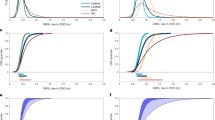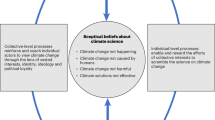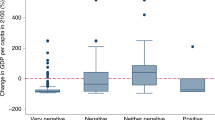Abstract
Predictions about the effects of climate change cannot be made with complete certainty, so acknowledging uncertainty may increase trust in scientists and public acceptance of their messages. Here we show that this is true regarding expressions of uncertainty, unless they are also accompanied by acknowledgements of irreducible uncertainty. A representative national sample of Americans read predictions about effects of global warming on sea level that included either a worst-case scenario (high partially bounded uncertainty) or the best and worst cases (fully bounded uncertainty). Compared to a control condition, expressing fully bounded but not high partially bounded uncertainty increased trust in scientists and message acceptance. However, these effects were eliminated when fully bounded uncertainty was accompanied by an acknowledgement that the full effects of sea-level rise cannot be quantified because of unpredictable storm surges. Thus, expressions of fully bounded uncertainty alone may enhance confidence in scientists and their assertions but not when the full extent of inevitable uncertainty is acknowledged.
This is a preview of subscription content, access via your institution
Access options
Access Nature and 54 other Nature Portfolio journals
Get Nature+, our best-value online-access subscription
$29.99 / 30 days
cancel any time
Subscribe to this journal
Receive 12 print issues and online access
$209.00 per year
only $17.42 per issue
Buy this article
- Purchase on Springer Link
- Instant access to full article PDF
Prices may be subject to local taxes which are calculated during checkout

Similar content being viewed by others
Data availability
The data that support the findings of this study are available online at http://osf.io/tgmyh.
References
Moss, R. H., & Schneider, S. H. Guidance Papers on the Cross Cutting Issues of the Third Assessment Report of the IPCC (eds Pachuri, R. et al.) 33–51 (World Meterological Organization, 2000).
Brewer, N. & Burke, A. Effects of testimonial inconsistencies and eyewitness confidence on mock-juror judgments. Law. Hum. Behav. 26, 353–364 (2002).
Penrod, S. & Cutler, B. Witness confidence and witness accuracy: assessing their forensic relation. Psychol. Public Policy Law 1, 817–845 (1995).
Bonaccio, S. & Dalal, R. S. Advice taking and decision-making: an integrative literature review, and implications for the organizational sciences. Organ. Behav. Hum. Decis. Process 101, 127–151 (2006).
Phillips, J. M. Antecedents of leader utilization of staff input in decision-making teams. Organ. Behav. Hum. Decis. Process. 77, 215–242 (1999).
Price, P. C. & Stone, E. R. Intuitive evaluation of likelihood judgment producers: evidence for a confidence heuristic. J. Behav. Decis. Mak. 17, 39–57 (2004).
Sniezek, J. A. & Van Swol, L. M. Trust, confidence, and expertise in a judge–advisor system. Organ. Behav. Hum. Decis. Process 84, 288–307 (2001).
Van Swol, L. M. & Sniezek, J. A. Factors affecting the acceptance of expert advice. Br. J. Soc. Psychol. 44, 443–461 (2005).
Fox, C. R. & Irwin, J. R. The role of context in the communication of uncertain beliefs. Basic Appl. Soc. Psychol. 20, 57–70 (1998).
Johnson, B. B. Further notes on public response to uncertainty in risks and science. Risk Anal. 23, 781–789 (2003).
Johnson, B. B. & Slovic, P. Presenting uncertainty in health risk assessment: initial studies of its effects on risk perception and trust. Risk Anal. 15, 485–494 (1995).
Butler, K. Toward understanding and measuring conditions of trust: evolution of a conditions of trust inventory. J. Manag. 17, 643–663 (1991).
Priester, J. R. & Petty, R. E. Source attributions and persuasion: perceived honesty as a determinant of message scrutiny. Pers. Soc. Psychol. Bull. 21, 637–654 (1995).
Priester, J. R. & Petty, R. E. The influence of spokesperson trustworthiness on message elaboration, attitude strength, and advertising effectiveness. J. Cons. Psychol. 213, 408–421 (2003).
Joslyn, S. & Savelli, S. Communicating forecast uncertainty: public perception of weather forecast uncertainty. Meteorol. Appl. 17, 180–195 (2010).
Morss, R. E., Demuth, J. L. & Lazo, J. K. Communicating uncertainty in weather forecasts: a survey of the U.S. public. Weather Forecast. 23, 974–991 (2008).
Du, N., McEnroe, J. E. & Stevens, K. The joint effects of management incentive and information precision on perceived reliability in fair value estimates. Account. Res. J. 27, 188–206 (2014).
IPCC Climate Change 2007: Synthesis Report (eds Core Writing Team, Pachuari, R. K. & Reisinger, A.) (IPCC, 2007).
IPCC Climate Change 2014: Synthesis Report (eds Core Writing Team, Pachuari, R. K. & Meyer, L. A.) (IPCC, 2014).
Joslyn, S., Savelli, S. & Nadav-Greenberg, L. Reducing probabilistic weather forecasts to the worst-case scenario: anchoring effects. J. Exp. Psychol. Appl. 17, 324–353 (2011).
Hohle, S. M. & Teigen, K. H. More than 50% of less than 70% chance: pragmatic implications of single-bound probability estimates. J. Behav. Decis. Mak. 31, 138–150 (2018).
Eppler, M. J. & Mengis, J. The concept of information overload: a review of literature from organization science, accounting, marketing, MIS, and related disciplines. Inform. Soc. 20, 325–344 (2004).
Chae, J., Lee, C. & Jensen, J. D. Correlates of cancer information overload: focusing on individual ability and motivation. Health Commun. 31, 626–634 (2016).
Joslyn, S. & LeClerc, J. E. Climate projections and uncertainty communication. Top. Cogn. Sci. 8, 222–241 (2016).
Jensen, J. D. Scientific uncertainty in news coverage of cancer research: effects of hedging on scientists’ and journalists’ credibility. Hum. Commun. Res. 34, 347–369 (2008).
Jensen, J. D. et al. Including limitations in news coverage of cancer research: effects of news hedging on fatalism, medical skepticism, patient trust, and backlash. J. Health Commun. 16, 486–503 (2011).
Jensen, J. D. et al. Communicating uncertain science to the public: how amount and source of uncertainty impact fatalism, backlash, and overload. Risk Anal. 37, 40–51 (2017).
Hansen, J. et al. Efficacy of climate forcings. J. Geophys. Res. 110, D18104 (2005).
Understanding the Link Between Climate Change and Extreme Weather (US EPA, 2017); https://go.nature.com/2mluCkv
MacKinnon, D.P., Fairchild, A.J. & Fritz, M.S. Mediation analysis. Ann. Rev. Psychol. 58, 593-614 (2007).
Imai, K., Keele, L. & Tingley, D. A general approach to causal mediation analysis. Psychol. Methods 15, 309–335 (2010).
Imai, K., Keele, L. & Yamamoto, T. Identification, inference and sensitivity analysis for causal mediation effects. Stat. Sci. 25, 51–71 (2010).
Hicks, R. & Tingley, D. Causal mediation analysis. Stata J. 11, 609–615 (2011).
Grounds, M. A., Joslyn, S. & Otsuka, K. Probabilistic interval forecasts: an individual differences approach to understanding forecast communication. Adv. Meteorol. 2017, 1–18 (2017).
Harris, A. J. L., Por, H. & Broomell, S. B. Anchoring climate change communications. Climatic Change 140, 387–398 (2017).
Cohen, J. Statistical Power Analyses for the Behavioral Sciences (Academic, 1969).
Prentice, D. A. & Miller, D. T. When small effects are impressive. Psych. Bull. 112, 160–164 (1992).
Ballard, T. & Lewandowsky, S. When, not if: the inescapability of an uncertain climate future. Phil. Trans. R. Soc. A 373, 20140464 (2015).
Hogg, M. A. Subjective uncertainty reduction through self-categorization: a motivational theory of social identity processes. Eur. Rev. Soc. Psychol. 11, 223–255 (2000).
Morton, T. A., Rabinovich, A., Marshall, D. & Bretschneider, P. The future that may (or may not) come: how framing changes responses to uncertainty in climate change communications. Glob. Environ. Change 21, 103–109 (2011).
Rabinovich, A. & Morton, T. A. Unquestioned answers or unanswered questions: beliefs about science guide responses to uncertainty in climate change risk communication. Risk Anal. 32, 992–1002 (2012).
Joslyn, S. & LeClerc, J. E. Uncertainty forecasts improve weather-related decisions and attenuate the effects of forecast error. J. Exp. Psychol. 18, 126–140 (2012).
Honaker, J., King, G. & Blackwell, M. Amelia II: a program for missing data. J. Stat. Softw. 45, 1 (2011).
McKnight, P. E., McKnight, K. M., Sidani, S. & Figueredo, A. J. Missing Data: A Gentle Introduction (Guilford, 2007).
Lüdecke, D. esc: Effect size computation for meta-analysis. R version 0.4.0 https://CRAN.R-project.org/package=esc (2019).
Tingley, D., Yamamoto, T., Hirose, K., Keele, L. & Imai, K. mediation: R package for causal mediation analysis. J. Stat. Softw. 59, 1–38 (2014).
Acknowledgements
This study was funded by the Woods Institute for the Environment and the Center for Ocean Solutions at Stanford University. The work was also supported by a National Science Foundation Graduate Research Fellowship grant and the Shaper Family Stanford Interdisciplinary Graduate Fellowship grant to L.C.H. and the Princeton University Institute for International and Regional Studies. J.A.K. is University Fellow at Resources for the Future.
Author information
Authors and Affiliations
Contributions
L.C.H., B.M., J.A.K., E.M.M. and R.S. developed the study idea. L.C.H., B.M., J.A.K. and E.M.M. designed the research. L.C.H. and B.M. analysed the data. L.C.H., B.M. and J.A.K. wrote the manuscript and E.M.M. and R.S. provided revisions.
Corresponding author
Ethics declarations
Competing interests
The authors declare no competing interests.
Additional information
Peer review information Nature Climate Change thanks David Budescu, Emily Ho, Susan Joslyn and the other, anonymous, reviewer(s) for their contribution to the peer review of this work.
Publisher’s note Springer Nature remains neutral with regard to jurisdictional claims in published maps and institutional affiliations.
Supplementary Information
Supplementary Information
Supplementary Notes 1–11, Tables 1–6, Figs. 1–3 and references.
Rights and permissions
About this article
Cite this article
Howe, L.C., MacInnis, B., Krosnick, J.A. et al. Acknowledging uncertainty impacts public acceptance of climate scientists’ predictions. Nat. Clim. Chang. 9, 863–867 (2019). https://doi.org/10.1038/s41558-019-0587-5
Received:
Accepted:
Published:
Issue Date:
DOI: https://doi.org/10.1038/s41558-019-0587-5
This article is cited by
-
Participating in a climate prediction market increases concern about global warming
Nature Climate Change (2023)
-
Integrating family farmers’ perceptions with meteorological records and national climate change projections to enhance site-specific adaptation knowledge
Mitigation and Adaptation Strategies for Global Change (2023)
-
Dimensions of uncertainty communication: What is conveyed by verbal terms and numeric ranges
Current Psychology (2023)
-
Predictors and consequences of intellectual humility
Nature Reviews Psychology (2022)
-
Evaluation of future estuarine floods in a sea level rise context
Scientific Reports (2022)



